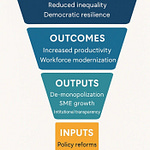For the past several decades, the IMF has enforced a combination of austerity (what they call a ‘balanced budget’ agenda), privatisation, and trade liberalisation on decolonising nations. This has stripped states in the Global South of the capacity to drive their development processes and protect their infant industries.
In order to deal with the resulting imbalances, the IMF has frequently encouraged underdeveloped countries to borrow from private capital markets, leading to more debt traps.
Meanwhile, the World Bank has historically followed an agenda of recommending anything but large-scale industrialisation for the Global South. In the early post-World War II era, this manifested in its recommendations for countries to stick to their ‘comparative advantage’ in exporting raw materials.
By the 1990s, the World Bank was promoting ‘financial deepening’, code for encouraging financial deregulation as a panacea for mobilising resources for development.
More recently, the World Bank has shifted its focus to promote development in the service sector and investment in small and medium-sized enterprises (SMEs), both recipes for continued debt bondage on the national and household level. The service sector is often dominated by multinational corporations (MNCs) with monopolistic structures, making states that focus their development on this sector susceptible to the whims of MNCs in the Global North. SMEs, which typically lack the resources (including government subsidies) to compete with MNCs and do not have the advantages of scale of MNCs, end up absorbed into these larger monopoly-dominated networks.
Indeed, the combination of financial liberalisation and the promotion of SMEs locks countries into what Amin called generalised monopoly capital, with both upstream (raw materials, technology, and capital) and downstream (distribution, marketing, and consumer access) networks of control.
excerpt from Tricontinental
video production by













